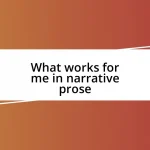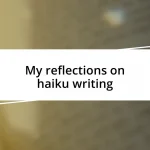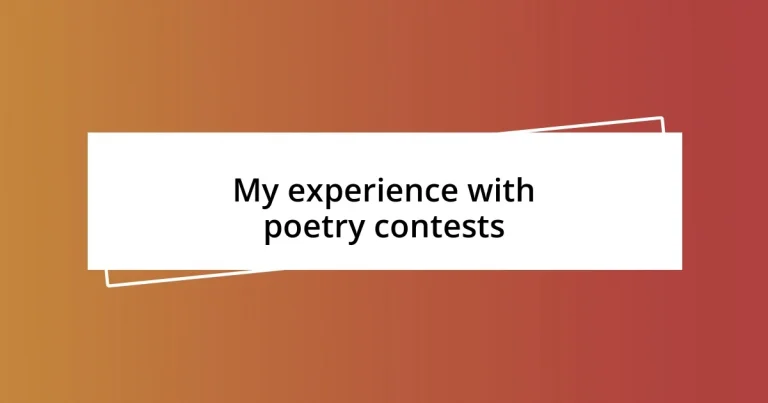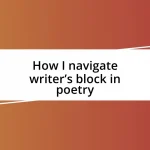Key takeaways:
- Participating in poetry contests can foster community connections and provide invaluable feedback from experienced judges, enhancing personal growth as a poet.
- Preparing submissions meticulously, adhering to guidelines, and sharing work with trusted peers can significantly improve the quality and impact of poetry submitted for contests.
- Reflecting on contest experiences, including both successes and failures, helps poets identify areas for improvement and strengthen their artistic voice through constructive criticism.
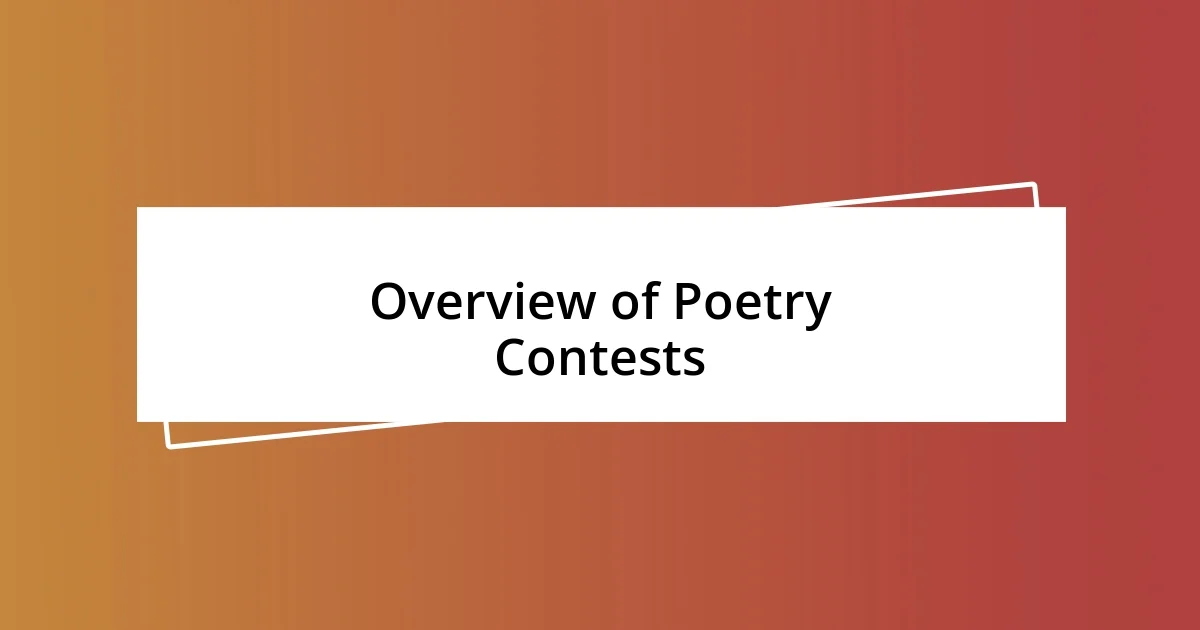
Overview of Poetry Contests
Poetry contests can serve as vibrant platforms for both emerging and established poets to showcase their work. I remember my first contest submission—an exhilarating blend of excitement and terror. Did I have what it takes to be recognized? That sense of uncertainty was both daunting and, ultimately, rewarding.
Many contests come with specific themes or prompts, allowing poets to explore their creativity in unique ways. When I entered a contest that focused on nature, I found myself inspired by the rustling leaves outside my window. It prompted me to write a poem that I never would have considered otherwise, revealing how the right challenge can spark innovation.
While prizes often include publication or monetary awards, the real treasure might just be the feedback and exposure that comes with participation. I recall the thrill of receiving constructive criticism on my work, which helped me grow as a poet. Have you ever wondered how getting your work evaluated by others could deepen your understanding of your own craft? It’s a journey I find invaluable, every time I engage in it.
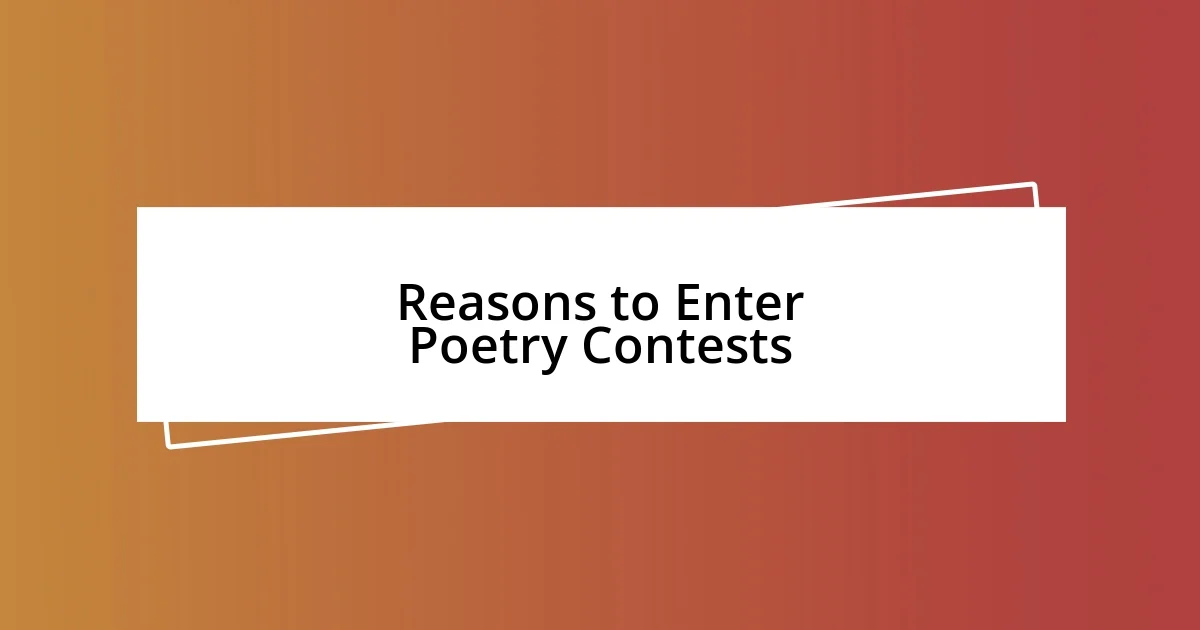
Reasons to Enter Poetry Contests
Participating in poetry contests can offer you a unique opportunity to connect with the community. I remember sitting in a local café, nervously awaiting the results of a contest I had entered. When I found out I won, it felt like I was suddenly part of a larger artistic family. That sense of belonging is something I treasure.
Moreover, contests often feature accomplished judges who provide invaluable feedback. I once received a comment from a renowned poet that shifted my entire perspective on writing. It was both a humbling and enlightening moment that pushed me to rethink my approach. This type of guidance can be a game-changer, stimulating growth in ways that solo writing often can’t.
Lastly, the thrill of competition can be a powerful motivator. When I first joined a contest, I was surprised at how it ignited my passion for writing. The pressure to create something compelling drove me to produce work I was genuinely proud of. Have you ever felt that rush of adrenaline when your words flow effortlessly? It’s exhilarating and a huge reason to consider entering contests.
| Benefits | My Experience |
|---|---|
| Community Connection | Winning a local contest made me feel part of an artistic family. |
| Expert Feedback | Receiving insights from a renowned poet transformed my writing perspective. |
| Motivation | The pressure of competition pushed me to create work I loved. |
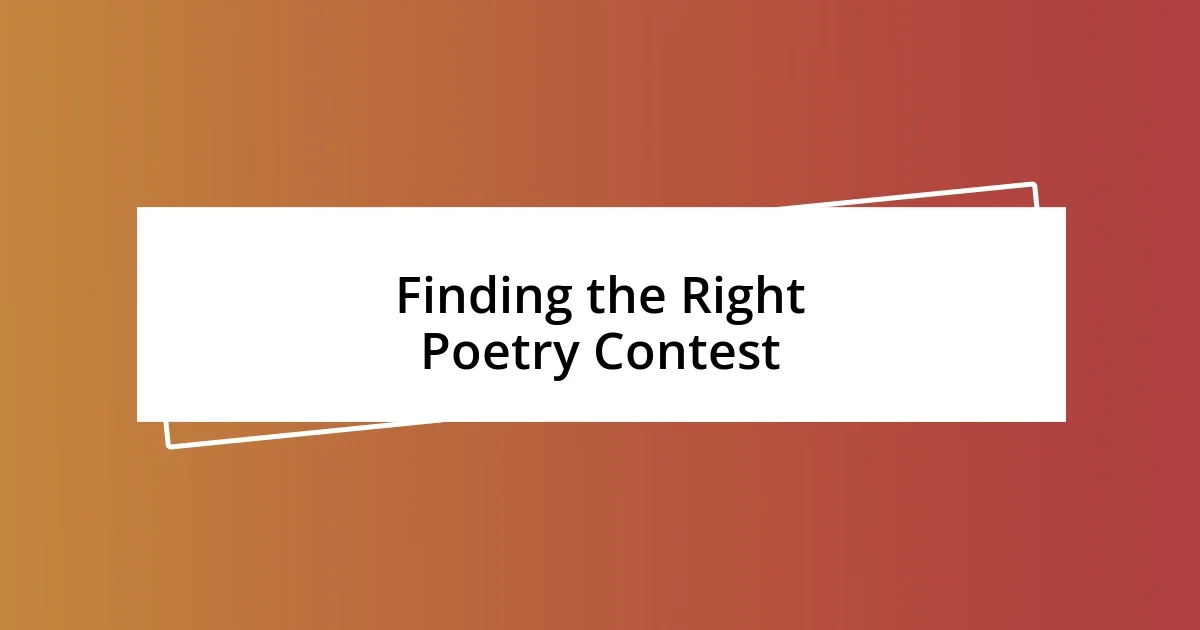
Finding the Right Poetry Contest
Finding the right poetry contest can feel overwhelming, but it’s essential to consider what you want from the experience. I remember sifting through countless opportunities, each with unique themes and requirements, trying to find the perfect fit for my voice. The right contest can amplify your creativity, especially if it resonates with your poetic style or personal experiences.
To help navigate the options, think about these factors:
- Theme Relevance: Does the contest theme inspire you?
- Entry Fee: Is it within your budget? Some contests have high fees that might not be worth the potential reward.
- Prizes Offered: Are the honors or publications appealing to you?
- Judging Credibility: Who are the judges? Their expertise can offer valuable feedback.
- Submission Guidelines: Are they easy to understand, or do they seem convoluted?
These elements can guide you toward contests that not only challenge you but also feel right for your artistry. As I refined my search, I discovered that aligning my work with a contest’s vision often led to some of my best poems emerging—poems that I hadn’t even realized were waiting to be written.
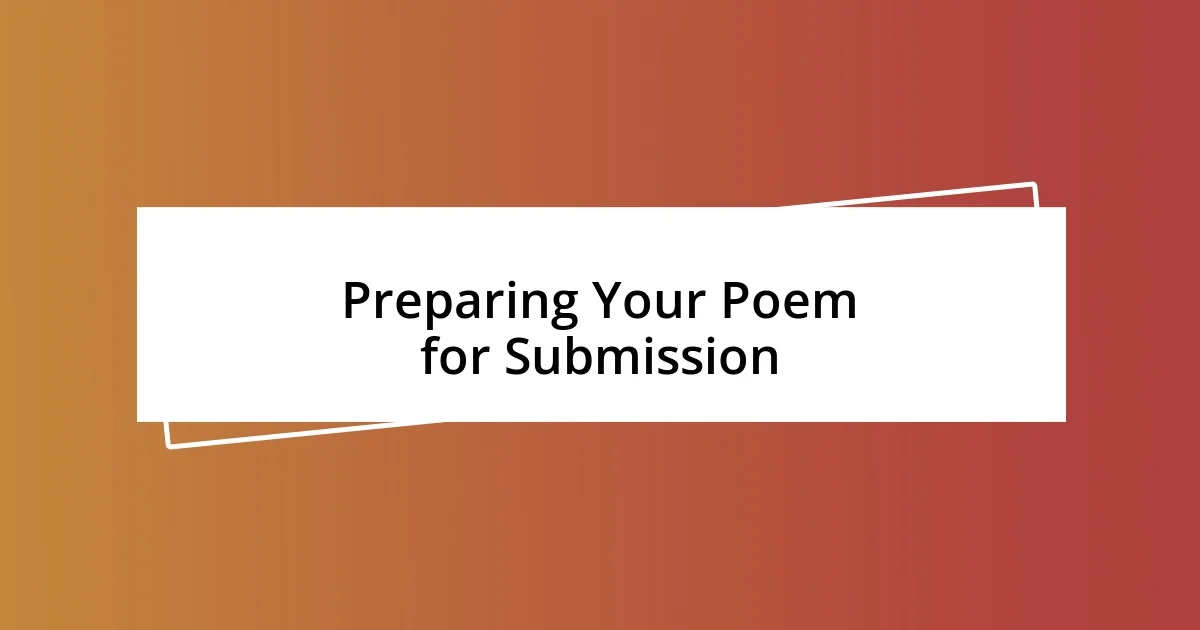
Preparing Your Poem for Submission
Preparing your poem for submission is a crucial step that can elevate your chances of success. I vividly recall the late nights I spent polishing my pieces, ensuring each word resonated perfectly. It made me realize that submission isn’t just about sending off words; it’s a commitment to presenting my best self. Have you ever felt that pressure to make every line shine?
Next, I recommend closely reading the contest’s submission guidelines. Ignoring these can lead to unnecessary disqualification. I learned this the hard way when a poem I was proud of was rejected simply because I missed the word count requirement. Making sure your poem adheres to specific formatting styles and rules can save you from unexpected disappointments. Trust me; attention to detail matters.
Finally, take the time to share your work with trusted friends or fellow poets before submission. Their feedback can reveal blind spots you didn’t notice. I found that having a fresh set of eyes can transform a good poem into something magical. How do you feel about sharing your work? The insights I gained through collaboration often propelled my poetry to new heights.
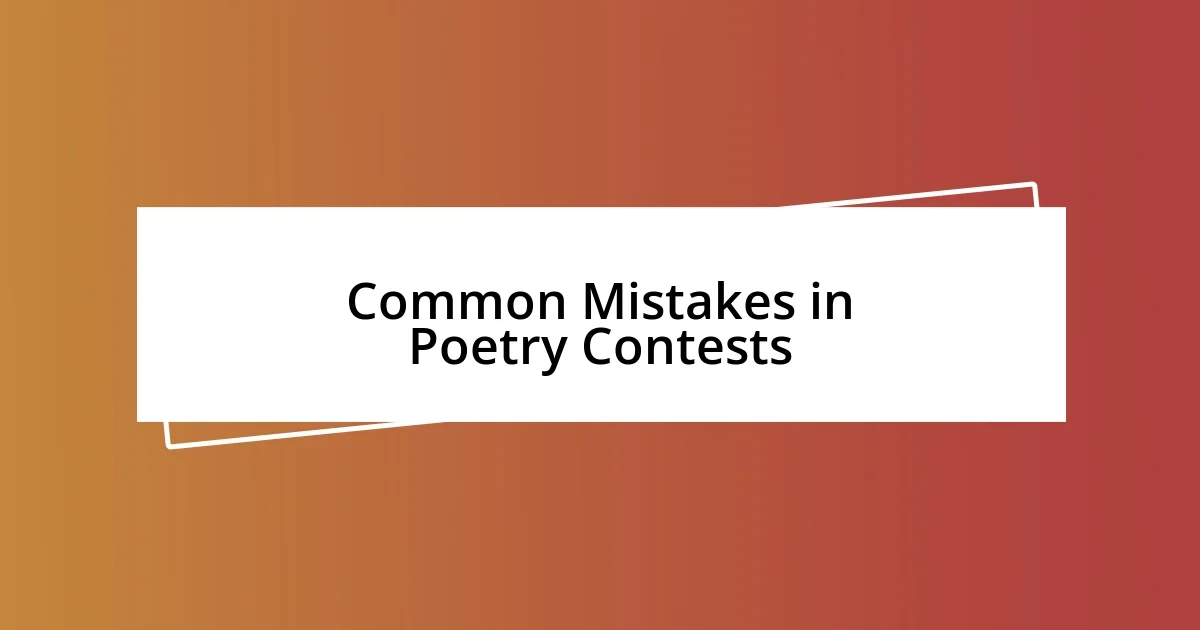
Common Mistakes in Poetry Contests
One of the most common mistakes I see poets make in contests is underestimating the importance of originality. I’ve been there myself—suddenly feeling the pressure to conform to trends or popular styles. I remember submitting a poem that, in hindsight, echoed a famous poet too closely. It felt safe, but the result was disappointing; the judges could spot the lack of authenticity from a mile away. Have you ever thought about what truly makes your voice distinct?
Another misstep is overlooking the emotional impact of the piece. A few times, I got so caught up in the technical aspects of rhyme and meter that I neglected to weave in my genuine feelings. I once submitted a technically sound poem that left me feeling empty, and unsurprisingly, it didn’t resonate with the judges either. How often do we forget to connect on that emotional level? Focusing on what stirs your heart can create a raw, relatable experience that judges appreciate.
Finally, I often see poets rush their submissions without adequate reflection. I used to treat contests as deadlines rather than opportunities for growth. I once submitted a poem that was more about meeting a date than expressing my feelings. Looking back, I realized that taking the time to fine-tune your message can make all the difference. Have you ever submitted something without really giving it a second glance? Embracing a more intentional approach could elevate your work far beyond mere participation.
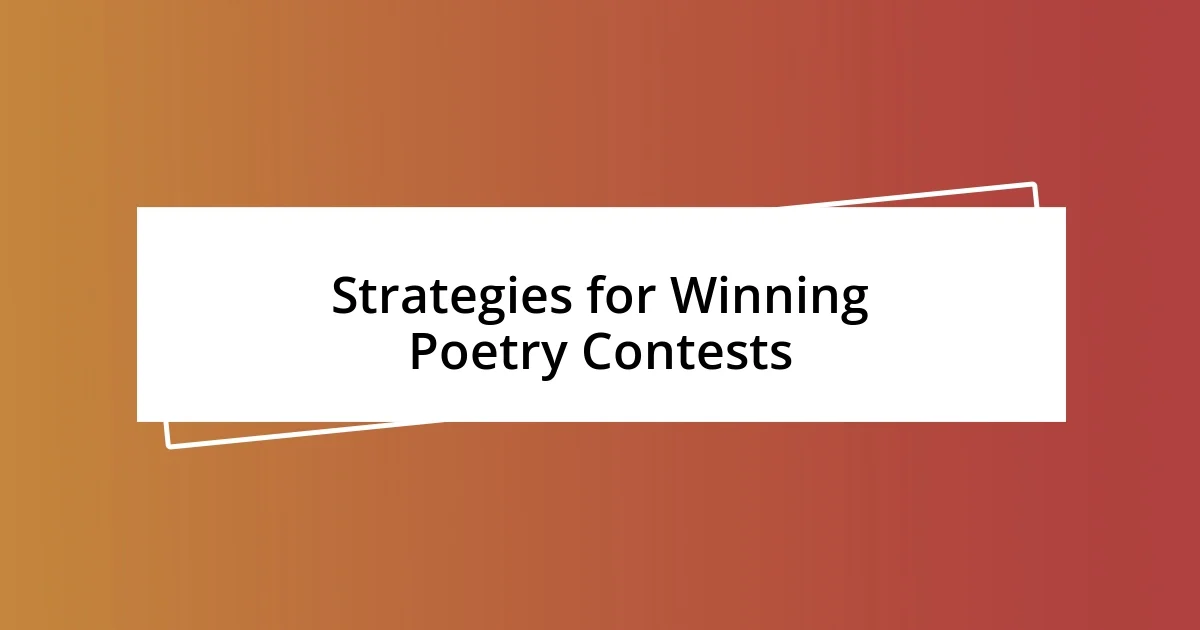
Strategies for Winning Poetry Contests
Strategies for Winning Poetry Contests
When preparing for a poetry contest, I discovered that reading past winning poems is incredibly enlightening. I remember combing through anthologies and online archives to analyze what resonated with both the judges and the audience. This practice opened my eyes to various styles and themes that did well while helping me identify how I could blend my voice with effective techniques. Have you ever wondered what makes a poem stand out?
Alongside reading, I can’t stress enough the power of practicing your poem aloud before submission. The first time I performed one of my pieces, I noticed subtle nuances I’d previously overlooked—words that tripped off my tongue or lines that sparked deep emotion. This practice allowed me to sense the rhythm and soul of my work in a way that printing it on paper never could. Have you considered how your poem sounds when shared out loud?
Lastly, developing a personal connection with the poem is crucial. In one contest, I wrote a piece about a loved one’s struggle, pouring my heart into the words. The judges resonated with the vulnerability, and to my astonishment, that poem won. Reflecting on that experience, I’m convinced that candor and sincerity shine through and leave an impact far greater than any flashy gimmick. How deeply do you connect with the themes you choose to explore in your poetry?
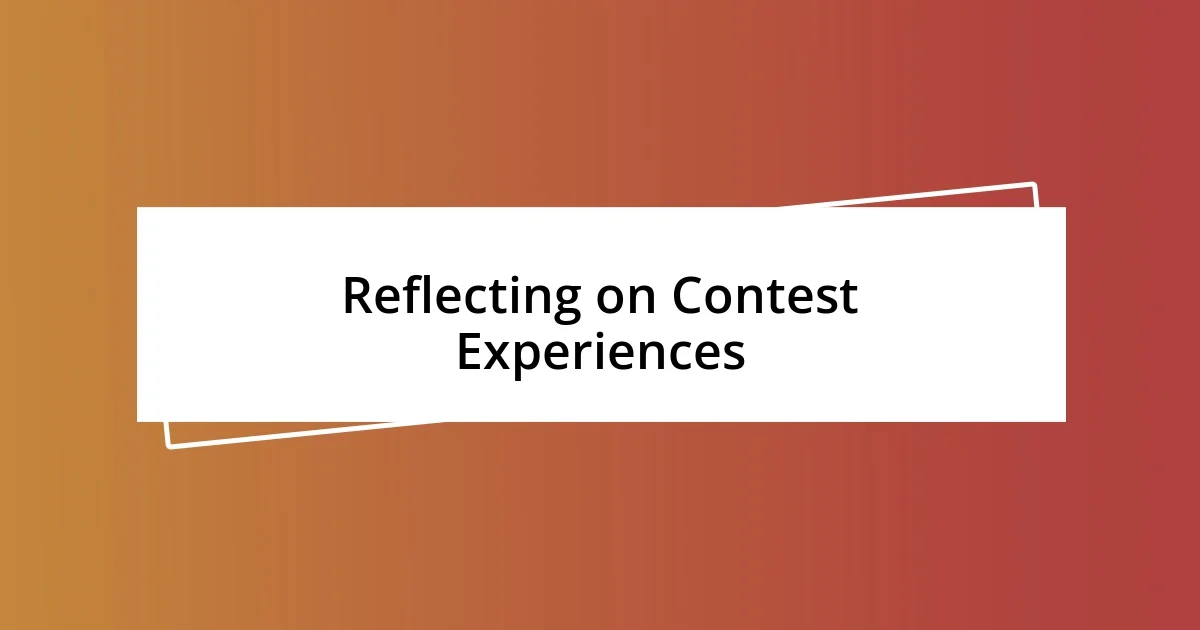
Reflecting on Contest Experiences
I’ve often found that reflecting on my contest experiences reveals the growth that often comes from failure. One year, I poured my heart into a poem about loss, only to receive a harsh critique that felt like a gut punch. In that moment, I questioned everything—my ability, my words, even my passion for poetry. Yet, weeks later, when I revisited that piece with fresh eyes, I discovered layers I hadn’t noticed before. Have you ever had a moment that made you reconsider your artistic path? For me, it was a turning point, reshaping my approach to both writing and entering contests.
Sometimes the feedback from judges can feel discouraging, but I’ve learned that it often contains valuable lessons. I remember reading comments that felt like a personal attack, but instead of sulking, I decided to analyze them. With each critique, I began to identify recurring themes in the feedback that illuminated my weaknesses. Have you ever faced criticism that turned out to be a hidden blessing? Embracing those insights not only sharpened my skills but also changed my mindset towards future submissions.
Looking back, the camaraderie I formed with fellow poets during contests always stands out. I developed friendships with writers who shared their process and struggles. One time, we gathered to share our works-in-progress, and I was struck by how different our perspectives were. In those discussions, I often realized that vulnerability strengthens our writing. How many connections have you made through shared artistic endeavors? Engaging with others has not only enriched my experience but has also provided a support system that encourages me to keep pushing my boundaries.

